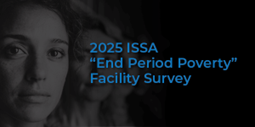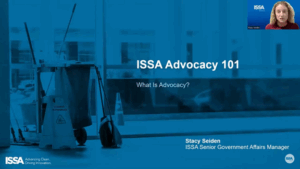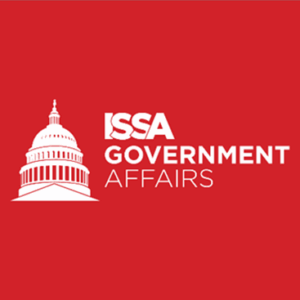ISSA Leg. & Reg. Update – Help ISSA Create a Recognized Apprenticeship Program
 Welcome to the latest ISSA Legislative & Regulatory Update, a biweekly roundup of the public-policy issues currently impacting the full cleaning supply chain. This update touches on ISSA needing your help to create a Recognized Apprenticeship Program, the U.S. Treasury releasing an initial list of jobs eligible for the “no tax on tips” deduction, ISSA’s new End Period Poverty Facility Survey Report, and more.
Welcome to the latest ISSA Legislative & Regulatory Update, a biweekly roundup of the public-policy issues currently impacting the full cleaning supply chain. This update touches on ISSA needing your help to create a Recognized Apprenticeship Program, the U.S. Treasury releasing an initial list of jobs eligible for the “no tax on tips” deduction, ISSA’s new End Period Poverty Facility Survey Report, and more.
Want to stay informed about critical government affairs impacting the cleaning and facility-solutions industry? Sign up here to have the ISSA Legislative & Regulatory Update emailed directly to you every other week.
ISSA Advocacy
ISSA Needs Your Help to Create a Recognized Apprenticeship Program
What it means: ISSA is working with the U.S. Department of Labor (DOL) to apply for a Recognized Apprenticeship Program. If approved, this program would create federally recognized career pathways for cleaning professionals. Please complete a two-minute survey to show your support for the creation of apprenticeships for the cleaning industry.
Why it matters: Benefits of an apprenticeship include:
- Increasing employers and employees’ access to federal and state tax credits, grants, wage reimbursement, and other financial aid.
- Increasing worker productivity and retention. According to the DOL, 97% of employers using Registered Apprenticeships say that it has increased worker productivity and 92% say that it has improved employee engagement and retention.
- Creating an industry-driven, high-quality career pathway for employees, thereby enhancing the professionalism of the cleaning industry.
What ISSA is doing with your help: One aspect of the apprenticeship application is to identify employment partners that ISSA can list as supporters of the creation of registered apprenticeships for the industry. There is no commitment to participate in the program once it’s approved, although we hope that you will. Take the survey now
Treasury Releases List of Jobs Eligible for ‘No Tax on Tips’ Deduction
What it means: The U.S. Department of the Treasury unveiled its preliminary list of jobs likely to be covered by the Trump administration’s “no tax on tips” policy under the One Big Beautiful Bill Act (OBBBA).
Why it matters: The law created a deduction of up to US$25,000 for qualified tips received by tipped workers, which will be in place from 2025 through 2028 unless Congress extends the deduction.
What ISSA is doing: This policy change was one of the top policies that ISSA advocated to have included in the OBBBA. As a result of our advocacy, the following cleaning-related occupations are likely to be eligible for tax-free earnings on tips:
- Personal Vehicle and Equipment Cleaners
- Personal Care and Service Workers
- Home Cleaning Service Workers
- Maids and Housekeeping Cleaners
The official proposed list of such occupations will be published in the Federal Register as part of forthcoming proposed regulations from Treasury and the Internal Revenue Service (IRS). Treasury and the IRS anticipate that the official proposed list will be substantially the same as this preliminary list. Public comments will be requested on the official proposed list of occupations and other aspects of the proposed regulations. Learn more (U.S. Department of the Treasury)

Now Available — 2025 ISSA End Period Poverty Facility Survey Report
What it means: Labor and technology continue to dominate much of the conversation around facility management, but another critical topic is emerging: access to essential period-care products (PCPs) for building occupants. This year, ISSA fielded its End Period Poverty Facility Survey to benchmark the adoption, availability, and decision-making practices around PCP provision across the industrial and institutional sector.
Why it matters: The survey, conducted by All In One Insights, gathered responses from facility managers, building service contractors, and in-house teams spanning commercial, healthcare, education, and industrial spaces. Respondents shared their perceptions and practices related to PCP accessibility, including procurement decisions, motivators, and perceived barriers. Notably, less than half of all surveyed organizations indicated that they offer PCPs in any form, with just over a third providing free and accessible PCPs in restrooms.
What ISSA is doing: As ISSA continues its advocacy and educational efforts to end period poverty, this survey provides critical benchmark data on current facility practices, sectoral differences, and opportunities to remove barriers to universal access. The report offers a snapshot of the key findings that will inform stakeholders—facility leaders, service providers, and advocates alike—as they work to ensure equitable health and hygiene for all building users. Access the report now

ISSA Advocacy 101: What Is Advocacy?
What it means: Check out this first installment of ISSA Advocacy 101, in which ISSA Senior Government Affairs Manager Stacy Seiden briefly explains what advocacy means for the cleaning and facility-solutions industries.
Why it matters: ISSA Advocacy 101 is a new video series by your ISSA Advocacy Team to provide quick insights into Government Affairs as it relates to our industries. The series is intended to further educate and engage our members in ISSA Advocacy.
What ISSA is doing: Stay tuned for future installments of the series that will highlight the who, when, where, why, and how of ISSA Advocacy. Watch the video now

It’s Not Too Late — Help Shape ISSA Government Affairs
What it means: ISSA is ramping up our government affairs to ensure that your and our industry’s interests are heard loud and clear in Washington, DC and state capitals.
Why it matters: That’s why we need your input in our quick ISSA Advocacy Survey. Your feedback will help shape the future of our advocacy priorities and make sure that we’re fighting for what matters most to you and your cleaning business.
What ISSA is doing with your help:
✅ The survey only takes a few minutes.
🎁 Complete it for a chance to win a US$100 gift card.
Your voice makes a difference—thank you for helping guide our work! Take the survey now
Additional Updates
Regulatory & Judicial
Trump Asks Supreme Court for ‘Expedited Ruling’ on Tariffs Appeal
The Trump administration asked the U.S. Supreme Court for an “expedited ruling” to overturn an appeals court decision that found most of his tariffs on imports from other countries are illegal. The U.S. Court of Appeals for the Federal Circuit, in a 7-4 ruling, said that Trump does not have the authority to implement most of his tariffs. The appeals court delayed its ruling from taking effect until October 14 to allow the Trump administration time to ask the Supreme Court to take the case and overturn the decision. Learn more (MSNBC)
Trump Imposes 50% Tariffs on Imports from India
President Trump made good on his threat to double tariffs on imports from India to 50%, a move that could endanger relations with one of America’s most important trading partners and send consumer prices higher. This comes just weeks after Trump instituted a new 25% baseline tariff on Indian goods. Levies on India, the world’s fifth-largest economy, are now among the highest the United States charges across all countries. The latest round of tariffs on India are intended to punish the country for importing Russian oil and helping Russia finance its war with Ukraine. Learn more (CNN)
Trump Finalizes Trade Deal with Japan
President Trump signed an executive order to implement a trade deal with Japan, with 15% baseline tariffs on most Japanese goods. The deal had been reached in July after months of negotiations, with Washington and Tokyo continuing to negotiate details for weeks before it was signed. Learn more (CNBC)
Legislative
Funding Fight in Congress as Shutdown Looms
Congress is marking up fiscal 2026 spending levels, but some in the Trump administration are pressing to bypass the process and instead extend current levels through a yearlong continuing resolution (CR). Republicans broadly agree that some form of CR will be needed to avoid a partial shutdown when fiscal 2025 ends on September 30; some appropriators are frustrated with a lack of a top-line budget number from the U.S. House of Representatives, Senate, and White House as they continue their work. Meanwhile, Democrats appear to be taking a tougher stance on the looming deadline to keep the government open than they did earlier this year. Learn more (Fox News)
House Republicans Launch Bill to Extend Health Subsidies
Ten U.S. House of Representatives Republicans are leading new legislation that would extend enhanced tax credits for coverage under the Democrats’ 2010 health law. While it’s unlikely to be enacted as a standalone proposition, the bill could offer the GOP a path forward on the issue and sends an important signal that the party is increasingly seeing real political risk in letting these subsidies expire at the end of the year. The legislation would extend the subsidies for one year, punting the issue past the 2026 midterms. Learn more (Politico)
State News
Many States’ Employee-Friendly Labor Laws Take Effect
The U.S. National Labor Relations Board remains without a quorum, leaving key decisions and enforcement actions on hold. In the meantime, state legislatures across the country have introduced new labor laws that increase employer obligations—often in areas traditionally under federal oversight. These measures include bans on mandatory captive audience meetings, expanded unemployment benefits for striking workers, and broader jurisdiction for state labor boards. Learn more (JacksonLewis)
NM to Ban Products with ‘Forever Chemicals’
New Mexico will soon release an initial draft of rules to ban consumer products that contain so-called “forever chemicals,” the state’s top environment official told lawmakers. Earlier this year, Governor Michelle Lujan Grisham signed House Bill 212, passed by lawmakers to institute the gradual phasing out of intentionally added per-and-polyfluouroalkyl substances (PFAS) in everyday items. New Mexico is the third state to enshrine a ban in state laws to address the use of PFAS in consumer products, joining Maine and Minnesota. Learn more (Source NM)
CT Minimum Wage Rising to Second Highest in US
Connecticut Governor Ned Lamont announced that the state’s minimum wage will increase to $16.94 per hour on January 1, 2026, the second highest among the 50 states. Learn more (CT Insider)
MN Restrictive Covenants — What Constitutes Solicitation?
The Minnesota legislature’s ban on new noncompetition agreements in 2023 has caused the state’s employers to rely more heavily on other legal means to protect their businesses from unfair competition by departing employees. In particular, the ban has forced Minnesota businesses to focus more on non-solicitation agreements, i.e., agreements that prohibit an employee from soliciting the employer’s customers for a certain period after leaving employment.
That renewed emphasis, in turn, has caused employers and employees alike to consider the specific parameters of “solicitation” under such agreements. Three decisions by the federal district court in Minnesota have shed light on how the courts will approach this evolving issue. Learn more (The National Law Review)














